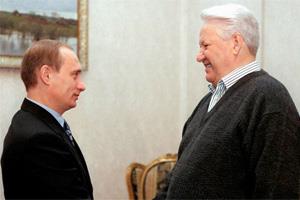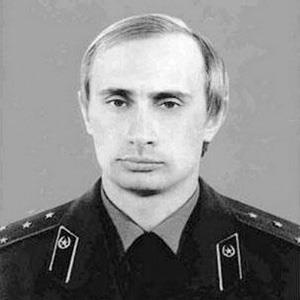I knew a number of things about Vladimir Putin before I sat down to PBS’ Frontline’s two-part program Putin’s Revenge, which premieres Wednesday (at 10 p.m. ET, check local listings).
I knew that he was born in Leningrad, that he joined the KGB long before the collapse of the Soviet Union, that he rose through the ranks at the KGB while the Soviet state was falling apart around him, and that — despite his sworn allegiance to the Communist state — he was privately a devout follower of the Russian Orthodox Church, a patriarchal branch of the Eastern Orthodox churches that date back to the heyday of the Russian Tsars. Historical luminaries like Peter the Great grabbed one of the most backward countries on earth by the scruff of the neck and, through sheer force of will, made Russia one of the world’s great powers.

Putin’s specialty while in the KGB, as Frontline points out early in Wednesday’s program, was counterintelligence, not traditional spy-craft. He was more John le Carré than James Bond. He had an eye and ear for bureaucratic detail — how to examine documents and change them just so, shaping them to serve his own ends. Although he won the early confidence of post-Soviet leader Boris Yeltsin (right, with Putin), he was privately appalled by what he saw in Yeltsin: a slob, not so much a useful idiot as the useless kind, constantly soused on vodka and making one catastrophic decision after another. To Putin’s thinking, once-great Russia, one of the western world’s original founding powers and home to some of western culture’s greatest achievements, was falling to ruin, and it was all Yeltsin’s fault.
Frontline skirts around the Yeltsin gossip — fun though it may be — and instead shows how Putin, early in his career, resolved to make Russia great again, by consolidating his own power and making sure the trains in Leningrad ran on time. To Putin, Russia’s golden age was not the Soviet Union of Lenin, Stalin, and Nikita Khrushchev, but the Russia of the tsars, Peter the Great in the 17th century and Catherine the Great in the 18th century, the Russia of the Kirov and Bolshoi ballets, of Tchaikovsky and Shostakovich, the Russia that held out against — and eventually defeated — Napoleon and Hitler, the Russia of some of the greatest novelists, playwrights, and classical composers western culture has ever seen. This is how Leningrad came to be renamed Saint Petersburg rather than Petrograd, as it was known at the time of the October Revolution of 1917. (Interesting fact: Putin’s Revenge premieres 100 years to the day after Lenin’s Bolshevik revolution, aka Red October, which occurred on Oct. 25, on Russia’s old-style calendar.)
There’s a telling story — skirted over in the Frontline documentary but telling just the same — that Putin, at KGB headquarters for Eastern Europe in Dresden, was literally the last person to turn out the lights, while, outside on the street, a mob went wild, intoxicated by freedom and hopped up on booze. The story is that Putin locked the door behind him, looked at the mob with disgust and resolved then-and-there that the new Russia, his Russia, would never again be reduced by such squalor and disorder.
There’s a widespread belief that Putin, knowledgeable and well-educated, speaks fluent English, but prefers not to in interviews and when meeting foreign dignitaries, because he’s thinking about his next move during the laborious, often slow translations from English to Russian and back into English again. The chess master at work.
There’s yet another story — more-or-less confirmed by Hillary Clinton during her book tour for her autobiography, What Happened — that Putin is utterly devoted to wildlife conservation, everything from Siberian tigers to the Siberian crane. (The Siberian crane is a distant genetic relative of North America’s once critically endangered whooping crane.)
This is not some publicity gimmick, either, dreamed up by a savvy PR minder. The word deep inside the conservation community is that Putin’s interest in wildlife conservation is genuine and personal. Following what looked to outside eyes like a cheap publicity stunt in 2012, when Putin flew a microlight aircraft to supposedly help guide a flock of young Siberian cranes on their annual migration route, he phoned a number of his conservation critics in Russia — this was Putin himself, as reported at the time in The Guardian, and not some actor pretending to be Putin on the phone — and asked them why they were so hard on him.
Hillary Clinton told Stephen Colbert, during her Late Show appearance last month that, when she sat down to a private chat with Putin, she found him to be distant, cold and disinterested on every single issue she raised with him until she turned the conversation to wildlife conservation. Putin suddenly sprang to life, Clinton recalled. She was startled that, of all the issues she had tried to raise with him — nuclear non-proliferation, NATO, Ukraine, trade agreements, big oil, climate change — saving wild animals was the one that snapped him to attention.
This is important to know because the first part of Putin’s Revenge examines the origins of Putin’s cold, increasingly distant relationship with Clinton, both public and in private. Veteran Frontline correspondent Michael Kirk, who co-produced The Choice 2016, Divided States of America, and Bannon’s War, among others, does a fine job of showing how — and, more importantly, why — Putin consolidated his power.
Anyone looking at the entirety of Russia on a map, even without the breakaway republics of Estonia, Lithuania, Latvia, Ukraine, and Belarus, can’t help but notice that, as countries go, Russia is big, messy, unwieldy and virtually impossible for any one leader to govern, unless that leader is a strongman with a clear vision of what Russia must be — and do — if it is to reclaim past greatness.
In the second hour of Putin’s Revenge, which airs Nov.1, the story narrows and focuses on evidence that Putin apparatchiks and functionaries — Russian troll farms! — interfered with last November’s US elections. The second hour opens with the computer hacks of Democratic campaign headquarters, and the way staffers’ emails were intercepted, collated, and then shared around the world for anyone with an ax to grind against the Clinton campaign. Watching Frontline’s painstaking exposé of what happened and when, it’s hard to shake the feeling that Putin has been playing chess while everyone else — Julian Assange, included — has been playing checkers.

The most telling revelation of Putin’s Revenge is that it shows, in simple and easy-to-understand terms, that this was not a sudden, impulsive decision on Putin’s part. It cuts to the very essence of who he is, as a person and as a political leader. Putin’s eye for the excruciating minutiae of intelligence detail, his ability to set a long-range goal and then stick to it, no matter what, and an almost frightening patience in pursuit of a clear-head, single-minded goal — the chess player at work, again — was forged when he was a young man who joined the KGB as just another seemingly quiet, vaguely disinterested youth.
Putin has a lifelong history of playing the long game, while everyone else is focused on the next first down — classic distraction theory. Frontline and Michael Kirk have done a remarkable job of showing how, in the words of former Director of National Intelligence James Clapper in the program, “The Russians aren’t going to stop. Their experience in our 2016 election is going to embolden them to interfere in the future, maybe more aggressively.”
As Clinton 2016 campaign chair John Podesta recalls ruefully, in the opening moments of Putin’s Revenge’s second hour, “I was not aware at the time I had been hacked.”
Frontline doesn’t show it, of course — the footage probably doesn’t exist — but it’s not hard to imagine that, somewhere deep in the vaults of the Kremlin, Putin was smiling, like a minor character in a Chekhov play, the one standing at the back of the room, thinking about his next move.